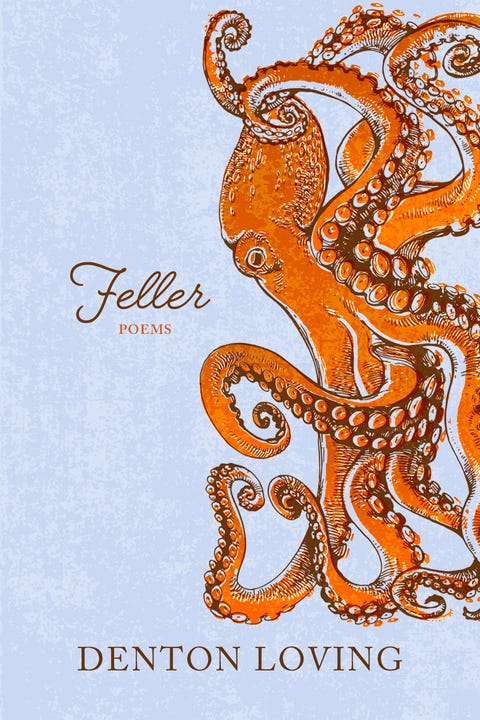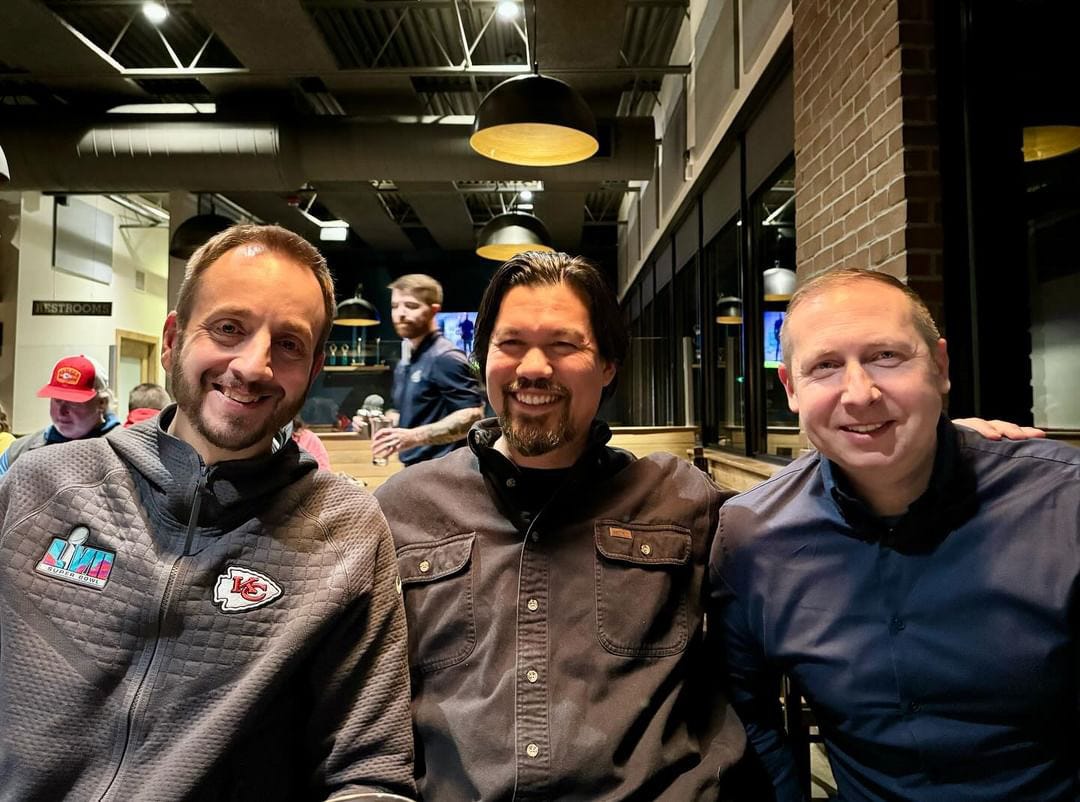"Abundance"
🌿 poet, writer, editor & teacher Denton Loving on abundance, working through fears and frustrations, and how being a writer doesn’t have to be lonely 🌿
This is a Beginner’s Mind interview, a series that explores the intersection of mindfulness and creative practice. Zen master Shunryū Suzuki Roshi said, “In the beginner’s mind, there are many possibilities; in the expert’s mind, there are few.” This series shines a light on the practices that sustain people in their daily lives and open the path to new possibilities. Subscribe below to make sure you don’t miss any future interviews. ✨
I’ve known Denton Loving since our MFA program, where we dubbed him our “Class President,” despite his continually shrugging it off. It was fun to tease him a bit for his immense competence and the way we all looked to him to herd us cats along, but for me, it was also because I knew he wasn’t actually interested in power. And, that’s who you want leading you, right? Denton is one of those rare humans who is just as kind and generous as he is brilliant. Over the last many years, he has built community everywhere he goes, while still staying rooted in his home near the Cumberland Gap in Tennessee. In the green fields and in the rise of the hills, in the rich, quiet beauty he writes of so vividly.
Matt W. Miller says of his forthcoming poetry collection, Feller, “With a naturalist's sense of ecology and concision, Denton Loving weaves out of this world both allegory and immediacy, a place where you can be both hurt and healed, and where you must unbramble all the truths of living through this earth.” I was lucky to read an early copy of this book and I could not recommend it more highly. You can pre-order it here at 25% off.
I really needed to hear what Denton shared in our conversation about his focus on abundance and working through his fears and frustrations, as well as his argument that “being a practicing writer doesn’t have to be lonely.” Yes! If you don’t know Denton yet, you’re in for a treat. Read on for a window into Denton’s writing and mindfulness practices (which feel like a dose of good medicine) as well as an excellent writing prompt that might be perfect for you this summer. 🌿
What are your writing/creative practices? Do you have any rituals or habits that help you?
I don’t really have any rituals or habits, but I wish I did. Maybe a good ritual would help me be a more consistent writer. Over the last couple of years, I’ve taken on more editing and teaching. Both are jobs that I love, but they are too often a trade off from my writing time. So I would describe my current writing practice as a bit scattered. It’s wonderful when I have chunks of time to write, especially when I have a project that I can really get excited about sticking with. But more often, I’m stealing small amounts of time to focus on a scene or an individual poem as images or lines come to me. That’s not to say that I only write when inspiration strikes. A lot of times, my writing practice begins with reading and just being open to something that gets my own gears to start turning.
What are your mindfulness practices? Can you describe your practices and what they bring into your life?
The best mindfulness practice I have is the act of writing “morning pages” although I don’t restrict myself to only writing them in the mornings. The idea of morning pages comes from Julia Cameron in her book The Artist’s Way. The idea is to go to the blank page when you first wake up and write three pages of whatever comes to your mind. Sometimes I only have time for one or two pages. Often, I write these pages at night before I go to bed, which I like because it sort of clears my headspace.
There are variations for how to do this and what works for different people. But for me, the morning pages allow me to purge whatever negativity is swirling around in my brain, and hopefully, to reframe it or to work through it. Sometimes, just allowing the negativity to come out – to identify it and name it – is enough to move past it. Sometimes, a few lines come in the morning pages that I recognize are something to keep for creative purposes. But usually, the morning pages are a receptacle for my fears and frustrations. Once I get all of that out, I rip the pages up and throw them away, which is really cathartic in itself. It’s also sort of like throwing the fears and frustrations away too.
Do you have a mantra or motto related to your creative/mindfulness practices/life?
Right now, I have two post-it notes above my desk. On one, I’ve written the word “Abundance,” and on the other, I’ve written the direction: “Accumulate Pages.”
Keeping the idea of abundance in front of me is a way to combat scarcity mentality. There’s scarcity in the way we all sometimes think about finances and time constrictions, but also, it’s so easy for creatives to think that our own ideas aren’t as good as other people’s, that if someone else’s book is successful that it takes away from the potential for our books, etc. I inherently don’t believe any of that, but sometimes I need to remind myself that I don’t believe it. I need to remind myself there’s room for me and my work.
The reminder to accumulate pages is also a reminder to not think too far ahead, and to not feel overwhelmed by the immensity of a project. My third book of poems is getting ready to be published. Each book started out with a single, stand-alone poem. I had no idea if the poem would work let alone if it would be part of something bigger. Never once did I start out thinking that I would write a book about a certain topic with X number of poems, etc. Instead, I’ve followed whatever was given to me, thinking only about the single poem in front of me. But sooner or later, those pages add up to something larger.
What helps you when you get stuck with your creative/writing or mindfulness practices?
Reading is what helps when I feel stuck in any sense. Whenever I feel scattered or overwhelmed, especially when I feel frustrated or stalled with my writing, I realize that I’ve pushed reading to the back burner. Some people view reading as unproductive at worst and self-indulgent at best. I think I allow myself to buy into that idea, especially when I feel too much pressure from the outside world. I convince myself somehow that I don’t have time to read because there’s too much work to do. I convince myself that by not reading, I’ll work faster and stay more focused. The reality is that reading generates new ideas, and it nourishes my brain and spirit the same way food nourishes my body. I have to remind myself of that sometimes.
What advice would you give someone who is trying to start or restart a creative or mindfulness practice?
I relate a lot to the difficulty of getting started and/or restarted with anything from exercise to mindfulness to practicing any kind of art including my writing. For me, being part of a community is so important. I rely on close relationships with other writers to help me see where my work falls short, how to improve, and just to inspire me to keep trying. The act of writing is very solitary. But being a practicing writer doesn’t have to be lonely. A lot of bookstores host writing groups that are open to writers at any level. Some cities have writers guilds that offer classes and create opportunities to meet other writers. Conferences and workshops are probably the best places to meet other writers. There are so many great ones offered all over the country.
As a young writer, I made really important friendships while attending the Appalachian Writers Workshop in Kentucky. For the last few years, I’ve been teaching at Table Rock Writers Workshop in North Carolina. Both are very inclusive communities for writers of all genres. At Table Rock, I’ve seen my students learn new craft skills and form friendships, both of which have propelled their writing. For people who aren’t able to easily leave home, there are weekend and even one day workshops. And there are so many wonderful workshop opportunities now online. Any opportunity to connect with other writers has a lot of value.
A Prompt from Denton 🌿
Similar to reading, I find engaging with visual art and music to be a great way to help harness any negative thoughts, and to process and reveal some of what’s buried under the operational surface of daily life. In terms of creative writing, one of my favorite craft lectures to teach is about ekphrasis, a word that comes to us from the Greek for “description.” Ekphrastic writing is a way for us to find inspiration by beginning with some other artistic medium. It could be music or film, but I especially enjoy using visual art.
When I teach this craft lesson, I show the students some photographs or paintings, and I ask them to start by narrating or reflecting on what’s happening in one of the images. This exercise doesn’t have to be restricted to people who live near museums. The internet is full of amazing images. If you don’t know where to start, I’d recommend the National Gallery of Art and The Metropolitan Museum of Art.
First, just allow yourself some time to look through images until you find something that speaks to you.
The second step is to write down what you see.
Then, write down how it makes you feel. You can add complexity to the exercise by placing yourself in the image, by reimagining the narrative, or by holding the image’s narrative up against contemporary politics or themes.
The visual art can be a mirror or a window or both. But by interrogating the art in this way, you can expand its meaning as well as reveal some of yourself. And this exercise works for any genre.

Denton Loving lives on a farm near the historic Cumberland Gap, where Tennessee, Kentucky, and Virginia come together. He is the author of three poetry collections: Feller, Crimes Against Birds, and Tamp which was a finalist for the Weatherford Award and recipient of the inaugural Tennessee Book Award for Poetry. He has received scholarships and fellowships from organizations such as the Collegeville Institute for Ecumenical and Cultural Research, the Eckerd College Writers Conference, and the Key West Literary Seminars. He earned the Master of Fine Arts in Writing and Literature from Bennington College in Bennington, Vermont. He is a co-founder and editor at EastOver Press and its literary journal Cutleaf. His fiction, poetry, essays and reviews have appeared in numerous publications including The Kenyon Review, Tupelo Quarterly, Iron Horse Literary Review and Ecotone.
For more from Denton 🌿
Order your copy of Denton’s new poetry collection, Feller, from Mercer University Press!
Find Denton on Facebook at @denton.loving; Follow Denton on Instagram at @dentonloving; Connect with him on LinkedIn at @dentonloving
For more info about his work, check out his website & newsletter
Upcoming Dates 🌿
Denton is teaching at the Table Rock Writers Workshop / August 25-29
Hear Denton read virtually for the Spoken & Heard Reading Series (online) / Sept 18 / 7 p.m. EST
Recent Work 🌿
Read Denton’s gorgeous poem, “Under the Chestnut Tree” at Ecotone
I loved this interview (and four poems!) with Denton at Salvation South, where he talks about his relationship to Appalachia and his path as a writer.
Aaaand, check out this feature of Denton’s work at Delta Poetry Review
What You May have Missed on Be Where You Are
The next Ass in Chair Collective this Mon, July 14th is for paid subscribers. The next free one is July 21st. Details below!👇🏼
If you tap that tiny heart before you go, it will help Denton’s work reach more readers!
🌱 Be Where You Are is 100% reader-supported. You can support this work by becoming a free or paid subscriber, or you can make a one-time donation here. Or, you can send it to a friend! Every bit helps more than you know. 🌱
Be Where You Are is a newsletter about how to use writing and mindfulness to live more fully where you are. To reply to this newsletter, just hit reply. I’d love to hear from you! I read and respond to every comment. You can also find me on Instagram / Facebook / Bluesky or find more info at my website.






Thank you for this awesome post! You really grabbed my attention as I’ve recently been acutely aware of how I’ve not been honoring my creative side. I’ve let “to do lists” and outside pressures limit the time I spend in creative processes. It’s occurred to me that I’m going to die with an unfinished “to do list”, so why am I self sabotaging? Is it a fear that I feel my ‘art’ is inadequate and that time in the creative process is a waste? Maybe, but I also realize that I was never encouraged to practice my art or anything creative. This is probably what I’m pushing back against the most. As a child, I was not understood. I was bullied. I’ve grown a thicker skin and I will now honor my true nature.
The creative practice that helps me most is journaling first thing in the morning. It can be about anything, but I often start with a dream or something I’ve thought or felt first thing in the morning. I also love to do a little drawing or watercolor. If I’m struggling for inspiration, I will go to the creative bug website. My local library offers that site to me for free. There are many amazing art teachers on that platform.
The mindfulness practices that help me connect most are Yin yoga, meditation, and my daily walk in nature. I find that my dog Maya helps me get outside every day which is so helpful. I also start my morning in the spring through fall outside on my deck with my journal while while I’m listening to birds and taking in nature. I would say that my garden practice is also another mindfulness practice. Gardening barefoot really helps me ground and stay more calm and connected. I found both The Artist’s Way and The Artist’s Way At Work to be two books that are a wealth of inspiration.
I’m so happy this resonated with you, Mary! Denton also got me thinking about my own morning pages practice and creative energy. Thank you for sharing these excellent questions and practices 🩵